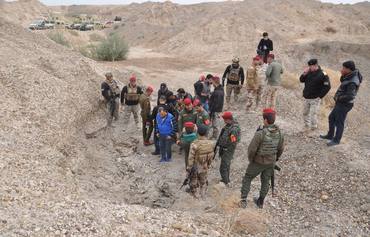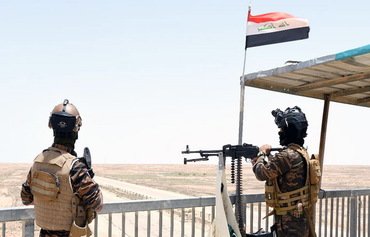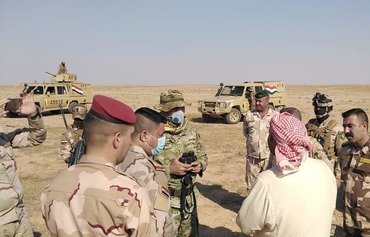Iraqi forces have reopened four desert roads in western Anbar that had been closed since the "Islamic State of Iraq and Syria" (ISIS) invaded the province in 2014, a tribal leader said Tuesday (January 7th).
The reopened roads include the 90-kilometre stretch from Rawa district to al-Hadr in Ninawa province and the road from al-Sukhairiyat to Baiji district in Salaheddine province, Anbar tribal commander Sheikh Qatari Samarmad al-Obeidi told Diyaruna.
The third road extends from the area of Abu Dallaya in northern al-Haditha district to al-Thirthar Lake, while the fourth also leads to the lake from western Anbar, he said.
These roads traverse through remote areas deep in the desert and have been rigged with improvised explosive devices (IEDs) planted by ISIS elements when they were in control of Anbar, he said.
![An Iraqi army helicopter conducts a reconnaissance sortie on September 20th to secure Wadi Houran in the western Anbar desert. [Photo courtesy of the Iraqi Ministry of Defence]](/cnmi_di/images/2020/01/08/21832-Iraq-Anbar-desert-600_384.jpg)
An Iraqi army helicopter conducts a reconnaissance sortie on September 20th to secure Wadi Houran in the western Anbar desert. [Photo courtesy of the Iraqi Ministry of Defence]
Forces from the al-Jazeera Operations and the 7th and 8th divisions' commands have cleared the roads of all IEDs, said al-Obeidi, "with at least 135 IEDs of different types and sizes removed and detonated".
Enhanced security in western desert
Desert areas near the roads were also secured during the eighth phase of the "Will of Victory" security campaign, which was launched on December 29th, al-Obeidi said.
The troops participating in the operation "destroyed dozens of the terrorist enemy's secret hideouts and tunnels, in addition to a large number of IEDs, weapons and vehicles", he said.
Al-Obeidi noted that enhanced security measures have been implemented in the western desert, including "stepped up reconnaissance and offensive sorties by the Iraqi army, reaching at least 10 sorties per day".
The opening of new roads will also facilitate the military units' movement and response to reports they receive from intelligence sources, he said.
Meanwhile, security forces continue to strengthen their relationship with shepherds and desert dwellers, he said, as these residents "provide very important security information on the terrorist remnants' whereabouts and movements".
Thanks to this support "our forces have been able to reduce the threat from terrorist elements, preventing them from obtaining logistical support and stopping their cross-border infiltrations".

![An Iraqi soldier flashes the victory sign after an ISIS hideout was targeted near the town of Heet, western Anbar province, on October 21st, leading to the death of four ISIS remnants. [Photo courtesy of the Iraqi Ministry of Defence]](/cnmi_di/images/2020/01/08/21831-Iraq-Heet-security-600_384.jpg)






